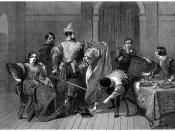In "The Taming of The Shrew", a play by William Shakespeare, feminism is indirectly stated through the over powerful males in the play. The dominance of Petruchio in his marriage to Katherine is shown to be mean and even silly, Baptista's control over his daughters' lives is evident, and even comes off as unfair when he forces Katherine, the shrew, to marry before Bianca, and man's lust and need for women is exaggerated through Lucentio and Hortensio's obsessed courtship of Bianca.
Against Katherine's will, Petruchio and Katherine are married, quickly establishing Petruchio as the dominant figure in the relationship. Immediately after the marriage where Petruchio embarrasses Katherine and shames her, he takes her home and begins to "tame" her in the same way one would tame an animal; by depriving her when she does not agree with everything he says or acts the least bit independent, and rewarding her when she shows total obedience.
However, his methods for gaining her loyalty seem uncivilized and terrible, despite his ways being common practice in Elizabethan times. In this way, the audience is lead to think about the "what ifs" of a more equal household; a very radical feminist idea.
Baptista, as the father of Katherine and Bianca is able to and often exercises control over their lives. From what they own and who they are taught by, to the people they marry and when they are able to marry, Baptista holds absolute power within the family. His daughters Bianca and Katherine are about as opposite as sisters can be. Fair and collected, Bianca is courted by many men, while the angry, brash Katherine is feared by many men for her temper. Baptista knows this and wants a future for both children so he makes it that Bianca cannot marry until Katherine...


